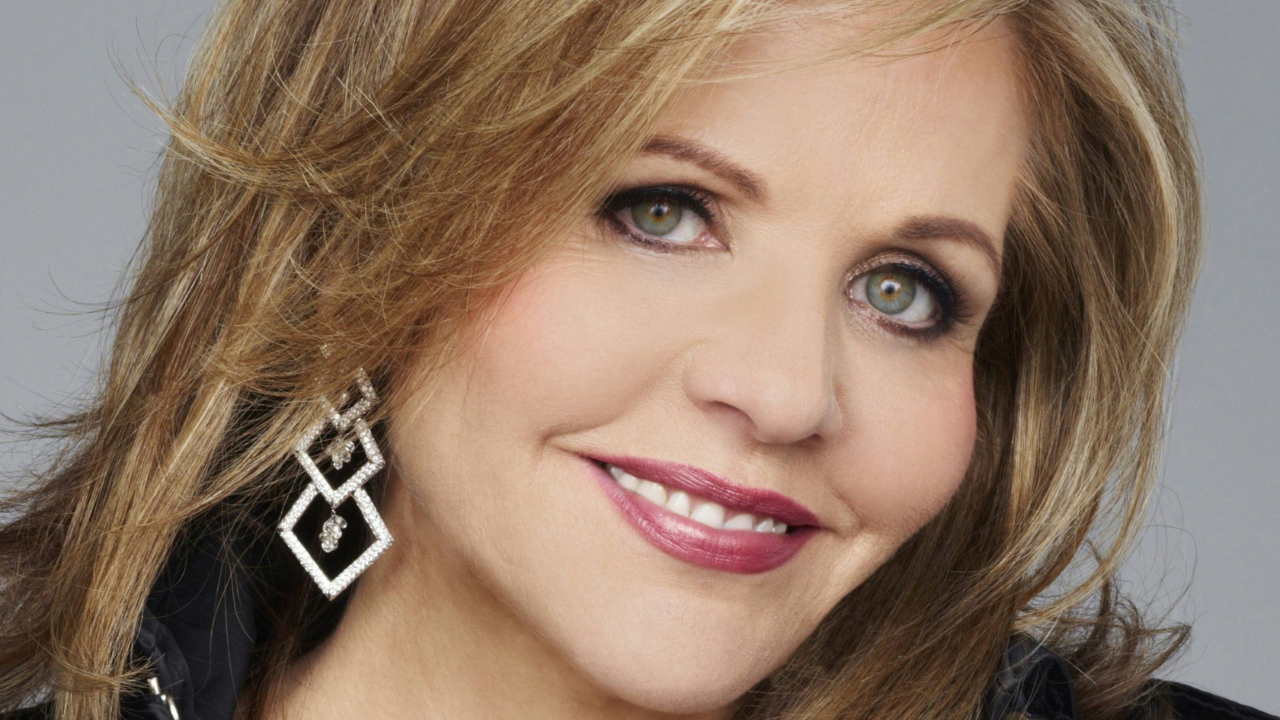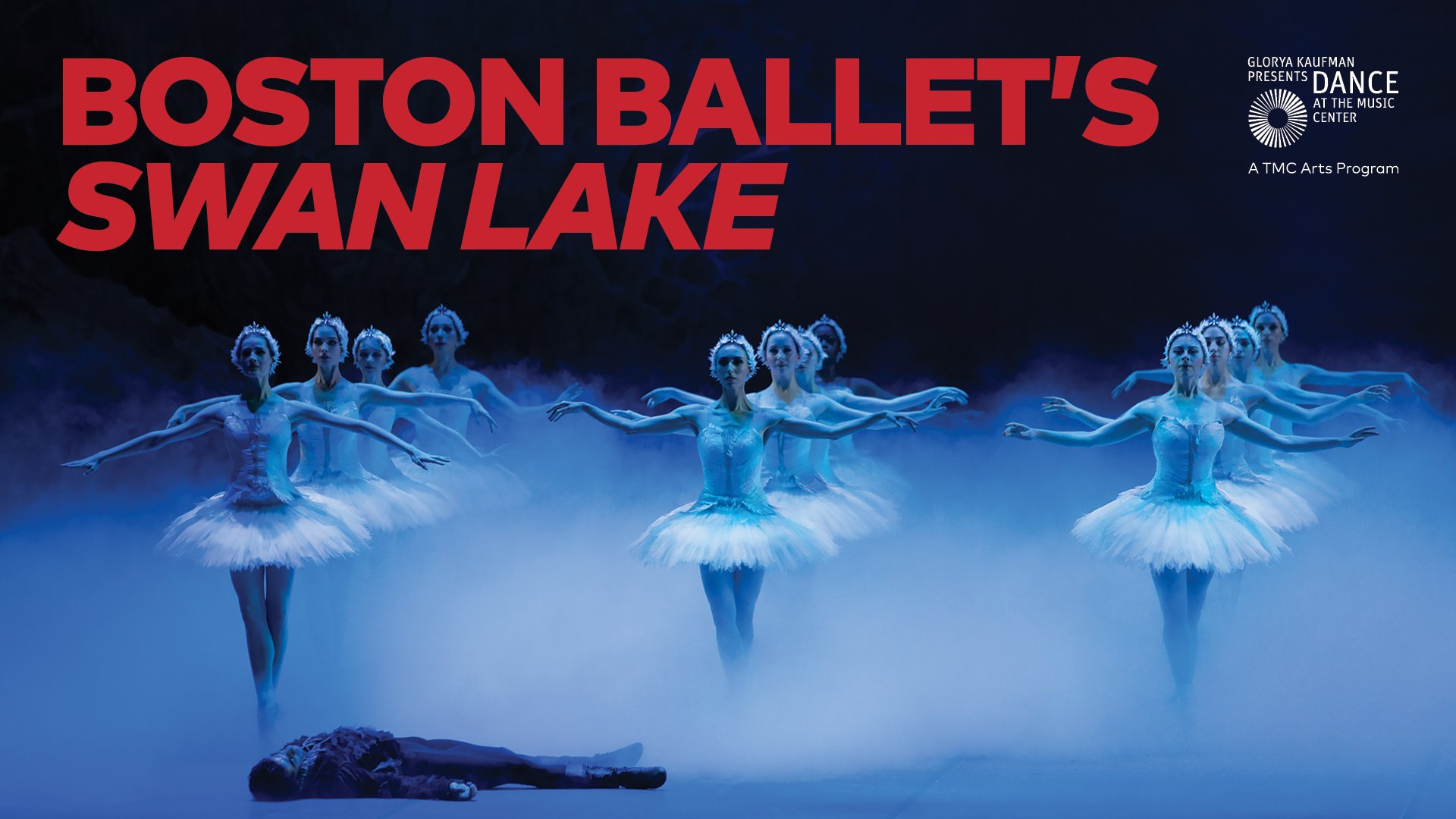The Music Center's Dorothy Chandler Pavilion
The first and largest of the four Music Center venues, the Dorothy Chandler Pavilion (Pavilion) was originally called the Memorial Pavilion and was renamed the Dorothy Chandler Pavilion by the Los Angeles County Board of Supervisors in honor of Dorothy Buffum Chandler. The Pavilion has one of the largest stages in the United States and has been the site of unparalleled performances by remarkable music and dance luminaries and virtuosos. It served as home to LA Phil for decades and the site for more than 20 Academy Awards presentations (from 1969-1999). It is now home to LA Opera and Glorya Kaufman Presents Dance at The Music Center.
In conceptualizing the approach to the Pavilion, the architects and designers of Welton Becket & Associates were guided by the idea that the building must not show its back to any part of the city, and, hence, developed the concept of a pavilion. A massive, curved structure with stylized columns, a gently swooping flat roof and a glass façade, the Pavilion was designed to fulfill the functions of three major halls, including a symphony with the accordant acoustics; a grand opera, which requires a sizable stage and house; and a more intimate setting supported by an appropriate sound system or orchestra for light opera, ballet and similar presentations. Like the great music and performances, it would house, the Pavilion’s design reflects elegance and beauty while being contemporary and understated.
Measuring 330-feet long and 252-feet wide and featuring 92-foot high columns that rise from the Jerry Moss Plaza level, the Pavilion’s gracefully curving sides express the functional curve of the auditorium within. The exterior walls are built of charcoal black granite and dark glass, providing a strong contrast to the fluted quartz-chip concrete columns and the broad overhang.
Designer Tony Duquette and Becket’s interior designers applied Becket’s “total design” philosophy to create an atmosphere of grandeur for the Pavilion. Nothing escaped their attention. Hong Kong-based artisans wove special carpets; team members traveled to Bavaria to assure the precise cutting of the crystal that would be used in the building’s chandeliers; and Becket engaged the finest acousticians of the time.
The theatre lobby is an elegant two-story space that wraps around the east side of the building. The lobby is covered in honey-toned Mexican onyx. Crystal sconces and columns faced with hand-cut Byzantine-style mosaic tile from Venice, Italy, complement the onyx walls. There are more than one million mosaic tiles throughout the Pavilion along with 78 wall sconces and chandeliers, most composed of hand-cut Bavarian crystal.
The lobby features a 24-karat gold-leaf dome that was originally built solely for beauty. The design team soon discovered that sound reverberated underneath the dome, causing an echo and making conversation difficult. The leaf dome thus serves two objectives: It contributes an elegant design element to the space and also eliminates the crowding often found in theatre lobbies. The lobby features paintings and sculptures, including busts of LA Phil conductors Alfred Wallenstein and Otto Klemperer, created by Anna Mahler, daughter of composer Gustav Mahler.
The grand stairway from the lobby rises above a gold tiled reflection pool, which features sculptures by Enzo Plazzotta, including a male figure honoring Russian ballet star Rudolf Nureyev and a female figure entitled “Ballet Shoes.” The entire staircase is surrounded with mirrored walls, and stairs are carpeted in olive green and trimmed with white marble. The flooring in the foyer is surfaced with a pale terrazzo. The landing of the staircase on the way to the second level features George Kolbe’s piece, “Beethoven Genius.”
On the second floor of the Pavilion is the Eva & Marc Stern Grand Hall. The Hall extends along the north end of the building and features three-story-high ceilings. The walls are covered with honey-toned Mexican onyx, and the columns are faced with the same hand-cut Byzantine-style mosaic tile from Venice, Italy, as was used in the lobby. Overlooking the Grand Hall are the First and Second Terraces, which form curved galleries similar to balconies. The Terraces provide a spectacular view of three gracefully suspended crystal chandeliers. This floor also features a bronze bust of Mrs. Chandler, sculpted by Los Angeles Times editorial cartoonist and Pulitzer Prize winner Charles Conrad.
The Becket team devoted two years to the design and creation of the three crystal light fixtures that adorn the Hall. With 27,500 pieces of crystal that create cascades of crystal tiers, each chandelier features 3,500 12-inch colonial prisms that sparkle as they dangle from gold-leafed frames. Each fixture measures 17 feet high and 10 feet in diameter and weighs a ton and a half. The sheer scale and size of the chandeliers demanded they be assembled in the Hall itself.
On the east side of the Hall is the Oval Lounge, which was once called the Oval Room. The main refreshment area in the Pavilion, the Oval Lounge offers an atmosphere of quiet relaxation with walls paneled in black walnut, dark mirrors and a huge oval-shaped antique marble bar.
Above the bar is a shimmering sculpture by Portland, Oregon artist Thomas Hardy. The gold-leafed bronze sculpture, entitled “Sun Birds,” features more than 500 birds, which the artist describes as “an explosion of birds into the air.” Hardy wanted the sculpture to be a “jewel in a dark quiet space.” This effect is achieved by suspending the sculpture from a recessed dome that conceals the room’s main light source, providing a dramatic setting at night. The Lounge also features a bust of Giuseppe Verdi honoring the bicentenary of his birth. It was donated to LA Opera by the Consulate General of Italy-Los Angeles on the company’s opening of Verdi’s Falstaff in 2013.
Other artwork in the Lounge includes Sandi Fox’s “Signature Quilt,” saluting individuals who were instrumental in the early success of The Music Center. In addition to The Music Center logo, the quilt features representations of the original three theatres and the Hollywood Bowl, along with signatures by Yo Yo Ma, Gregory Peck and Natalie Wood. The Lounge is also home to an 18th century Chinese Coromandel screen; Frank Stella’s painting “Ossipee III”; Leonardo Nierman’s tapestry “Music!”; and Los Angeles artist Michael McMillan’s nine-foot-high sculpture “Bunker Hill”. McMillan’s work is an artistic representation of what the location for The Music Center looked like prior to its construction.
Becket employed an unconventional approach to the auditorium, creating a design that is nearly square in shape. The design allows for 90 percent of the audience to be seated within 105 feet of the stage, with the farthest seat located only 130 feet way from the stage. The auditorium seats approximately 3,200 guests and is arranged in four levels: Orchestra (1,442 seats), Founders Circle (471 seats), Loge (443 seats) and Balcony (lower with 350 seats and upper with 400 seats).
The Orchestra level offers continental seating—without center aisles and exits at the sides—to maximize seating. The last row of the Orchestra is only 98 feet from the stage. The three remaining levels rise above the Orchestra floor. The first row of the Founders Circle is only 80 feet back, the Loge is 85 feet back, and the Balcony is 91 feet from the curtain. The angle of vision to the stage is never more than 27 degrees down, including the last row of the Balcony’s second tier. Every seat has a completely clear view to the mid-point of the house curtain at the floor line.
Acoustically, Becket’s goal was to blend reverberance with clarity. A large gold-leaf fiberglass “acoustical cloud” can be moved forward or back and angled according to the needs of the production. The auditorium’s acoustics are also favorably impacted by a curved and sloping ceiling, balconies that are rounded and walls that lean inward as they rise to the ceiling.
The Pavilion stage is one of the largest and most flexible in the nation. At 60-feet wide, 30-feet high and up to 240-feet deep, it is as far from the front of the stage to the back of the stage as it is from the front of the stage to the back of the auditorium.
The stage has two curtains. The main stage curtain features Duquette’s sunburst design, the symbol of The Music Center, and is comprised of seven different materials in shades of gold and bronze. When Duquette was told his design was too difficult to make, he rented the Shrine Auditorium and hired his own seamstresses to create the 3,000-pound curtain that covers the stage.
The orchestra pit uses a mechanically operated floor in three parts, providing flexibility for any size orchestra and the needs of opera performances. In addition, the floor of the pit can be raised as high as the floor of the auditorium to increase the size of the stage. There are 10 dressing rooms on the stage and mezzanine levels and dressing rooms for 200 dancers and chorus members below the stage. The auditorium comprises only one-third of the entire building, with a music library, rehearsal halls and staff offices also housed there.
The floors inside the auditorium are covered in a red carpet on the Orchestra, Loge and Balcony levels with seats on these levels covered in red velour upholstery. The Founders level has a gold theme with gold velour upholstered seats and gold carpet. The walls of the Orchestra level feature wood paneling and four crystal sconces on each side.
The Pavilion’s Founders Room is an elegant lounge used by Founders members before performances and during intermissions. The two-story-high room features walls paneled with wood from the Australian Black Bean tree, which can grow to 100 feet high. The paneling was intricately designed to provide unity with the coffered ceiling trimmed with gold leaf. Floor-to-ceiling windows are spaced between the wall panels and reflected on the opposite wall with floor-to-ceiling mirrors. Dark green carpeting sets off the wood-paneled walls while harmonizing with the antique marble bar. The room features three elegant chandeliers that add a tone of gilded splendor. Two of the Venetian glass chandeliers are from the 1938 MGM musical, The Great Waltz, and the third was commissioned when the room was decorated.
The furnishings in the Founders Room include an 18th century French tapestry depicting an equestrian scene. The original sketch for the tapestry was created by Flemish painter Jacob Jordans. There are two 18th century Chinese red-lacquered chests and an 18th century Venetian secretary, a gift from the Elsie de Wolfe Foundation, which is made of walnut burl wood. Elsie de Wolfe was the first noted female interior designer and a mentor to Duquette. The Founders Room includes a portrait of Mrs. Chandler. The paintings in the room are on loan from LACMA (Los Angeles County Museum of Art).
Featured at the Dorothy Chandler Pavilion
-
Sat Apr 26 7:30 PM
Sun May 18 2:00 PM

LA Opera Ainadamar
Dorothy Chandler Pavilion
Margarita Xirgu has spent half her acting career in exile, mourning Federico García Lorca, the dear friend whom she couldn’t convince to flee Franco’s reign of terror. Lorca was once on the verge of writing his way into a new Golden Age in Spain. ...Show More
Margarita Xirgu has spent half her acting career in exile, mourning Federico García Lorca, the dear friend whom she couldn’t convince to flee Franco’s reign of terror. Lorca was once on the verge of writing his way into a new Golden Age in Spain. But dictators have no use for poets.
Resident Conductor Lina González-Granados leads this major company premiere. Grammy winner Osvaldo Golijov’s dramatic, flamenco-inspired score meets a poignant libretto by David Henry Hwang in what the LA Times calls “one of the most moving and meaningful operas of our time.” Ana María Martínez takes center stage as Lorca’s muse Margarita Xirgu, recounting the poet’s life and his last days in the Spanish Civil War. Daniela Mack steps into the role of Federico García Lorca, the man whose pen proved just as dangerous as any pistol.
Show Less -
Sat May 31 7:30 PM
Sat Jun 21 7:30 PM

LA Opera Rigoletto
Dorothy Chandler Pavilion
In a court ruled by decadence and corruption, the Duke of Mantua sits on top. Whatever he wants, he gets. And lately, he’s set his sights on Rigoletto’s daughter. It’s enough to send the carefree court jester into a deadly rage, but revenge comes ...Show More
In a court ruled by decadence and corruption, the Duke of Mantua sits on top. Whatever he wants, he gets. And lately, he’s set his sights on Rigoletto’s daughter. It’s enough to send the carefree court jester into a deadly rage, but revenge comes at a price he never expected.
Verdi master James Conlon conducts Rigoletto, featuring some of the most famous music in history. Quinn Kelsey, the premier Verdi baritone of his generation, returns to star in the title role, with tenor René Barbera as the suave and sadistic Duke and Italian soprano Rosa Feola as Gilda, his unsuspecting prey. Stage director Tomer Zvulun updates the action to Mussolini’s Italy, transporting audiences to a realm of glittering grandeur that’s absolutely rotten to the core.
Show Less -
Sat Jun 14 7:30 PM

LA Opera Renée Fleming & Friends
Dorothy Chandler Pavilion
An evening with one of the most celebrated voices of our time.
Legendary soprano Renée Fleming and special guests will take you on a sensational journey through...Show More
An evening with one of the most celebrated voices of our time.
Show LessLegendary soprano Renée Fleming and special guests will take you on a sensational journey through your favorite musical showstoppers in this breathtaking one-night-only concert with the LA Opera Orchestra.
Thu Jun 26 7:30 PM
Sun Jun 29 2:00 PM

A TMC Arts Program: Glorya Kaufman Presents Dance at The Music Center Boston Ballet's Swan Lake
Dorothy Chandler Pavilion
Step into the enchanting world of Swan Lake, a masterpiece of classical ballet that has mesmerized audiences for generations with exquisite dancing, enchanting music and a timeless tale of love and loss. Boston Ballet Artistic Director Mi...Show More
Step into the enchanting world of Swan Lake, a masterpiece of classical ballet that has mesmerized audiences for generations with exquisite dancing, enchanting music and a timeless tale of love and loss. Boston Ballet Artistic Director Mikko Nissinen’s exquisite production follows the Swan Queen Odette and Prince Siegfried in a tale of romance, sorcery and deceit. The second act, originally choreographed by Lev Ivanov, is historically considered the finest piece of classical choreography for the corps de ballet. The production showcases the technical precision and emotional tonality of dozens of dancers, brilliantly transformed by Robert Perdziola’s impeccable costume design and set to the timeless score by Tchaikovsky. Since 1963, Boston Ballet’s internationally acclaimed performances of classical, neo-classical and contemporary ballets, combined with a dedication to world-class dance education and community initiatives, have made the institution a leader in its field, with a 61-year history of promoting excellence and access to dance.
Show LessAges 8 and up
Learn MoreAges 8 and up
-
Wed Mar 19 12:00 PM
Mon Jun 30 6:00 PM

A TMC Arts Program: Digital Innovation Initiative The Music Center Presents Breakthru
Jerry Moss Plaza
Join us for Breakthru, a free daily movement and breathing-based microbreak on Jerry Moss Plaza at The Music Center. Every day at NOON and 6:00 p.m., Angelenos come together to move, breathe and reset—right in the heart of Downtown L.A.Show More
Join us for Breakthru, a free daily movement and breathing-based microbreak on Jerry Moss Plaza at The Music Center. Every day at NOON and 6:00 p.m., Angelenos come together to move, breathe and reset—right in the heart of Downtown L.A.
Guided by a series of two-minute breathing and movement sequences, shift your mood by choosing joyful, energized, centered and confident. This ever-evolving, crowd-curated experience gives us all permission to pause, reflect and recharge.
Show LessFree
Learn MoreFree
-
Wed Mar 19 12:00 PM
Mon Jun 30 6:00 PM

A TMC Arts Program: Digital Innovation Initiative The Music Center Presents Breakthru
Jerry Moss Plaza
Join us for Breakthru, a free daily movement and breathing-based microbreak on Jerry Moss Plaza at The Music Center. Every day at NOON and 6:00 p.m., Angelenos come together to move, breathe and reset—right in the heart of Downtown L.A.Show More
Join us for Breakthru, a free daily movement and breathing-based microbreak on Jerry Moss Plaza at The Music Center. Every day at NOON and 6:00 p.m., Angelenos come together to move, breathe and reset—right in the heart of Downtown L.A.
Guided by a series of two-minute breathing and movement sequences, shift your mood by choosing joyful, energized, centered and confident. This ever-evolving, crowd-curated experience gives us all permission to pause, reflect and recharge.
Show LessFree
Learn MoreFree
-
Sat Apr 19 8:00 PM

LA Phil Cody Fry with Orchestra
Walt Disney Concert Hall
The feeling you get when a black-and-white film suddenly bursts into technicolor in a rush of emotion? That’s the sound of Cody Fry’s music. It’s no wonder the singer, songwriter, composer, producer, arranger, and multi-instrumentalist has stirred...Show More
The feeling you get when a black-and-white film suddenly bursts into technicolor in a rush of emotion? That’s the sound of Cody Fry’s music. It’s no wonder the singer, songwriter, composer, producer, arranger, and multi-instrumentalist has stirred up a huge following over the last 10 years with his emotional orchestral pop. Fry followed up his #1 Billboard Classical Tracks hit "I Hear a Symphony" with 2023's The End, an album of lush, surging songs that explore intimate themes like mental health and personal change. Coming on the heels of a Grammy nomination for his re-orchestration of the Beatles' classic "Eleanor Rigby," it’s no wonder American Songwriter said, "Cody Fry’s music is simultaneously familiar and breathtakingly innovative."
Show Less -
Sat Apr 05 10:00 AM
Sat Apr 19 10:00 AM

A TMC Arts Program Gloria Molina Grand Park's Easy Mornings
Gloria Molina Grand Park
From puppetry, storytelling, and surfing in the park to arts and crafts and live DJ entertainment, Gloria Molina Grand Park’s Easy Mornings offers a variety of experiences for curious little minds! Start off the weekend with relaxing and ...Show More
From puppetry, storytelling, and surfing in the park to arts and crafts and live DJ entertainment, Gloria Molina Grand Park’s Easy Mornings offers a variety of experiences for curious little minds! Start off the weekend with relaxing and family-friendly activities for all ages, focused on deepening relationships with self, community and the park. This year, Easy Mornings is teaming up with Smorgasburg LA to bring more interactive experiences for everyone!
Show LessFree
Learn MoreFree
-
Wed Mar 19 12:00 PM
Mon Jun 30 6:00 PM

A TMC Arts Program: Digital Innovation Initiative The Music Center Presents Breakthru
Jerry Moss Plaza
Join us for Breakthru, a free daily movement and breathing-based microbreak on Jerry Moss Plaza at The Music Center. Every day at NOON and 6:00 p.m., Angelenos come together to move, breathe and reset—right in the heart of Downtown L.A.Show More
Join us for Breakthru, a free daily movement and breathing-based microbreak on Jerry Moss Plaza at The Music Center. Every day at NOON and 6:00 p.m., Angelenos come together to move, breathe and reset—right in the heart of Downtown L.A.
Guided by a series of two-minute breathing and movement sequences, shift your mood by choosing joyful, energized, centered and confident. This ever-evolving, crowd-curated experience gives us all permission to pause, reflect and recharge.
Show LessFree
Learn MoreFree
-
Wed Mar 19 12:00 PM
Mon Jun 30 6:00 PM

A TMC Arts Program: Digital Innovation Initiative The Music Center Presents Breakthru
Jerry Moss Plaza
Join us for Breakthru, a free daily movement and breathing-based microbreak on Jerry Moss Plaza at The Music Center. Every day at NOON and 6:00 p.m., Angelenos come together to move, breathe and reset—right in the heart of Downtown L.A.Show More
Join us for Breakthru, a free daily movement and breathing-based microbreak on Jerry Moss Plaza at The Music Center. Every day at NOON and 6:00 p.m., Angelenos come together to move, breathe and reset—right in the heart of Downtown L.A.
Guided by a series of two-minute breathing and movement sequences, shift your mood by choosing joyful, energized, centered and confident. This ever-evolving, crowd-curated experience gives us all permission to pause, reflect and recharge.
Show LessFree
Learn MoreFree
-
Wed Mar 19 12:00 PM
Mon Jun 30 6:00 PM

A TMC Arts Program: Digital Innovation Initiative The Music Center Presents Breakthru
Jerry Moss Plaza
Join us for Breakthru, a free daily movement and breathing-based microbreak on Jerry Moss Plaza at The Music Center. Every day at NOON and 6:00 p.m., Angelenos come together to move, breathe and reset—right in the heart of Downtown L.A.Show More
Join us for Breakthru, a free daily movement and breathing-based microbreak on Jerry Moss Plaza at The Music Center. Every day at NOON and 6:00 p.m., Angelenos come together to move, breathe and reset—right in the heart of Downtown L.A.
Guided by a series of two-minute breathing and movement sequences, shift your mood by choosing joyful, energized, centered and confident. This ever-evolving, crowd-curated experience gives us all permission to pause, reflect and recharge.
Show LessFree
Learn MoreFree
-
Sat Apr 19 8:00 PM

LA Phil Cody Fry with Orchestra
Walt Disney Concert Hall
The feeling you get when a black-and-white film suddenly bursts into technicolor in a rush of emotion? That’s the sound of Cody Fry’s music. It’s no wonder the singer, songwriter, composer, producer, arranger, and multi-instrumentalist has stirred...Show More
The feeling you get when a black-and-white film suddenly bursts into technicolor in a rush of emotion? That’s the sound of Cody Fry’s music. It’s no wonder the singer, songwriter, composer, producer, arranger, and multi-instrumentalist has stirred up a huge following over the last 10 years with his emotional orchestral pop. Fry followed up his #1 Billboard Classical Tracks hit "I Hear a Symphony" with 2023's The End, an album of lush, surging songs that explore intimate themes like mental health and personal change. Coming on the heels of a Grammy nomination for his re-orchestration of the Beatles' classic "Eleanor Rigby," it’s no wonder American Songwriter said, "Cody Fry’s music is simultaneously familiar and breathtakingly innovative."
Show Less -
Sat Apr 05 10:00 AM
Sat Apr 19 10:00 AM

A TMC Arts Program Gloria Molina Grand Park's Easy Mornings
Gloria Molina Grand Park
From puppetry, storytelling, and surfing in the park to arts and crafts and live DJ entertainment, Gloria Molina Grand Park’s Easy Mornings offers a variety of experiences for curious little minds! Start off the weekend with relaxing and ...Show More
From puppetry, storytelling, and surfing in the park to arts and crafts and live DJ entertainment, Gloria Molina Grand Park’s Easy Mornings offers a variety of experiences for curious little minds! Start off the weekend with relaxing and family-friendly activities for all ages, focused on deepening relationships with self, community and the park. This year, Easy Mornings is teaming up with Smorgasburg LA to bring more interactive experiences for everyone!
Show LessFree
Learn MoreFree
-
Wed Mar 19 12:00 PM
Mon Jun 30 6:00 PM

A TMC Arts Program: Digital Innovation Initiative The Music Center Presents Breakthru
Jerry Moss Plaza
Join us for Breakthru, a free daily movement and breathing-based microbreak on Jerry Moss Plaza at The Music Center. Every day at NOON and 6:00 p.m., Angelenos come together to move, breathe and reset—right in the heart of Downtown L.A.Show More
Join us for Breakthru, a free daily movement and breathing-based microbreak on Jerry Moss Plaza at The Music Center. Every day at NOON and 6:00 p.m., Angelenos come together to move, breathe and reset—right in the heart of Downtown L.A.
Guided by a series of two-minute breathing and movement sequences, shift your mood by choosing joyful, energized, centered and confident. This ever-evolving, crowd-curated experience gives us all permission to pause, reflect and recharge.
Show LessFree
Learn MoreFree

Tour The Music Center Campus
Free tours are available of all The Music Center's theaters.


